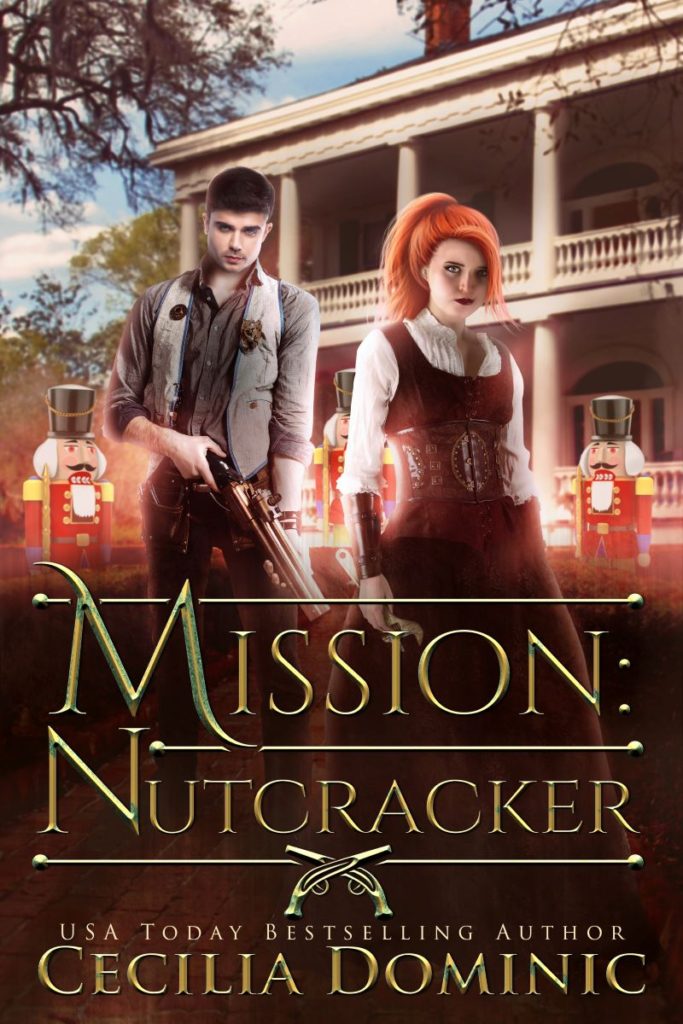Mission: Nutcracker

She dreams of joining the scientific elite. He’s desperate to save his business and his sister. Together, they may hold the turnkey to adventure…
Terminus, 1871. Fiona Telfair won’t give up her gears and gadgets for the ball and chain of marriage. But her future as a tinkerer comes under attack when nutcracker automatons raid the trade hall masquerade party and kidnap her fellow inventors. With her brilliant engineer father among those taken, Fiona’s only hope of rescuing him lies with the captivating rail baron who rescued her from the fray.
Devon Meriweather can only keep his train empire on track if he marries into an influential family. Plus, he needs the connections to make certain his chronically ill sibling is taken care of. So no matter how engaging and beautiful the firmly working-class Fiona may be, he knows she’ll only ever be a partner in solving crimes.
As they work closely hunting for clues to the strange aether-powered apparatus and magical mice, the intrepid duo can’t deny their budding feelings. But neither can afford a distracting courtship with the growing threat of the nutcrackers and their deadly chompers.
Can Fiona and Devon expose the menacing mastermind behind the machines and make their passion run like clockwork?
Mission: Nutcracker is the second book in the charming Inspector Davidson Mysteries steampunk romance series and can be read as a standalone novel. If you like plucky heroines, nineteenth-century mystique, and unusual Christmas fairytale retellings, then you’ll love Cecilia Dominic’s yuletide triumph.
Preorder now on…
Read the first chapter:
Terminus, 16 December 1871
Fiona pulled on her old gloves, which were already dingy but now made more so by a liberal application of coal dust. She smeared some of the dark gray matter on her cheeks, distributing it so it would draw the viewer’s gaze to her sparkling blue eyes. Her mask and headpiece with round ears in place, she stepped back from the mirror to check out her costume. Yes, in spite of the mask having a pointed nose with ridiculous whiskers, she made quite the fetching mouse. And the best part—the costume, which consisted of a simple gray dress she’d worn as part of her half-mourning—had been made of salvaged clothing and parts. She hadn’t spent any of the money set aside for her upcoming debut season, so her mother couldn’t argue with her desire or right to go to the Tinkerer’s Holiday Masquerade Ball.
Well, not unless her mother found out Fiona had been one of the few unattached females invited. But she didn’t need to know that. Fiona trusted her father not to tell, although he’d been known to slip.
A knock on the door startled her out of her thoughts, which had started to creep toward old, familiar territory. How could her brother have gotten himself killed and left her alone to manage her mother? Connor had been her mother’s favorite child. Fiona had never measured up.
“Are you ready, Pet?”
Fiona smiled at her father’s voice. “Yes, Papa. Be right out.”
She gave herself one more look from the front, and then another from the back. Good, her dress showed off her small waist and the white skin of her neck, and the dim light would keep anyone from noticing the freckles that popped out no matter what she did to get rid of them. Her dark red hair would shine like burnished copper in the candlelight, and what better to attract a handsome young inventor than copper? And her mind, which several of the tinkerers had said they admired. Granted, they hadn’t been looking at her mind at the time, but they shifted their gazes upward when they started discussing aether theory…
Another knock brought her back to herself. Then her father’s voice. “The steamcart is here.”
Again, her thoughts had run away with her. Her father laughed when that happened. Her mother sniffed disapprovingly.
“There’s nothing wrong with a girl with a quick mind,” her father would say.
“Not unless it keeps her from catching a rich husband.” Sniff. The sound made Fiona cringe every time. It even followed her into her dreams. Ever since Connor had died, that had become her mother’s refrain—catch a rich husband. Maybe then Fiona would finally earn her approval.
Well, Fiona was on the hunt tonight, but for brains, not money. She had faith that the latter would come from the former. Education could be bought. Intelligence could not.
Fiona walked out of her bedroom to find her father hilariously dressed as a cat. His gray mask had black tabby stripes painted on it, and he’d used kohl to continue the stripes on the side of his face. He’d even fixed pointed ears into his curly gray-specked black hair. His bright blue eyes—the same as Fiona’s—twinkled behind the mask. Otherwise, he wore all black evening dress with an emerald pin—his one piece left from his Irish father—in his cravat.
He kissed her cheek. “You look lovely, Miss Mouse.”
She giggled. “And you look ridiculous, Professor Cat.”
“That’s my job, Pet. To bring attention to the belle of the ball. And I have something for you.” He brought out a small box and gave it to her. Inside, nestled in cotton fluff, lay a dark gray chain with a pendant shaped like a cross between a walnut and a macadamia nut.
“What is it?” Fiona asked. “And what is the material?”
“A krakatuk nut locket. It’s an old family heirloom, and I don’t know about the metal. Your mother wanted me to wait until Christmas, but I thought I should give it to you now. Why don’t you hide it in your room so she doesn’t know?”
“Thank you. It’s lovely.” Fiona took one last look at it and stuck it in the drawer of her dressing table.
They descended the stairs of their modest townhouse. Fiona’s mother waited at the bottom.
Sniff. “Well, you’re a fine pair.” She crossed her arms over the black mourning dress she still wore. Her perpetual frown had drawn lines beside her lips, but otherwise she looked like an older, heavier version of Fiona. “Don’t be out too late.”
“Yes, Mother.”
Fiona’s father kissed his wife on the cheek, and Fiona smirked to see a little of the coal dust had rubbed on to him, and therefore on to her mother. Or maybe he’d smudged a stripe.
“I’ll have her back before midnight. It would be awkward for her to turn into a pumpkin, after all.”
Another sniff and not the faintest hint of a smile, although Fiona grinned at his joke. She’d thought about dressing as a pumpkin, but she didn’t have anything orange, as it was not a flattering color on her.
They almost ran out of the door and into the steamcart. Had this been a ball at one of the fine houses, they might have rented a carriage with real horses. But mechanical conveyance fit this particular party.
Once he’d confirmed Fiona was comfortable, her father lapsed into silence. He gazed out of the window, his hairline tight above his mask and his lips pursed below it, so she didn’t disturb him. Instead, she followed her own mental meanderings. One more check of the contents of her reticule, then back to the mathematical problem she’d been attempting to solve all week.
When the steamcart drew up to the door, Fiona’s father paid the driver and instructed him to return at eleven-thirty. The Tinkerer’s Guild Hall had been decorated in reds and greens. No religious imagery—they tended to shy away from objects that would remind the members of the long war they’d just come through and the losses they’d each experienced. No one wanted to think of funerals or discord as they all struggled to make sense of their new world.
Fiona and her father walked through the ballroom and nodded to acquaintances they recognized. Some wore costumes that covered their heads and all or part of their faces, making it more difficult for Fiona to identify them. The costumes ranged from scientific concepts and tools to animals or characters. One commonality—they all wore a concerned expression that would appear between words and smiles, reminding Fiona that some of their number had been disappearing. Indeed, the ball seemed less crowded than she’d expected. But at least they were all safe here among their own kind, weren’t they?
“Oh, there’s Thaddeus.” Fiona’s father veered to the right toward an older gentleman who, along with Fiona’s father, was a Master Tinkerer. “Will you be all right on your own for a bit? I have some things I need to ask him.”
“Yes, Papa. I’m going to get some punch.”
His smile gave him the look of a mischievous cat. “Don’t drink too much. Some young buck always adds spirits to it before the night is over.”
“Yes, Papa.” She wandered around the periphery of the ballroom. A chamber group played on a small stage between decorated trees, which held flickering candles and strings of popcorn. The gas sconces along the wall provided dim light. During meetings, the flames would be turned to medium or high so the members could see the books and papers being discussed, but tonight the lamps gave the room a warm, lovely glow. Fiona smiled—no seeing her freckles here! Some people danced, but tinkerers preferred to talk—well, argue—hence the limited number of musicians.
The sparkling of cut glass cups and a ladle in a stand beside a large crystal bowl drew her attention to the punch table. As she moved closer, the rosy concoction’s apple and cherry scents made her mouth water.. Ah, yes, the famed Tinkerer Hall punch, only served once a year at the holiday ball. Who had lent the family crystal to the party?
“May I pour you some punch?” A man’s deep voice resonated through her, and Fiona turned and stifled a gasp. Of course Devon Meriweather hadn’t bothered with any sort of costume, merely a plain black mask over the top half of his face. Still, she’d recognize him anywhere.
Fiona opened her mouth to speak, but only a squeak came out. Surely her face must be turning red beneath her mask.
“Ah, I admire your staying in character.” He grinned and picked up a cup and the ladle. “I’ll take that as a yes.”
She nodded. For some reason, she could converse comfortably with any of the other young men who had returned after the war ended, but she couldn’t string more than a few words together for the handsome but arrogant Meriweather.
He handed her the punch, and she did manage a, “Thank you.”
“You’re very welcome. Have you read anything good lately?”
Fiona hid her jaw drop by sipping the punch. No heat to indicate it had been tampered with—yet. She’d mentioned once that she liked Edgar Allan Poe—one of her few moderately successful and brief conversations with Meriweather—but he’d teased her about her morbid tastes.
She shook her head and took another sip, the words she wanted fleeing her brain like, well, mice before a cat.
“Ah, too bad. I’ve twisted my ankle and have been laid up, so I’ve been seeking recommendations.”
“Is that why you’re not dancing?” she blurted. Right, go for the inappropriate, almost personal question. She didn’t even know if he danced.
“Well, that and I hadn’t yet found a partner who interested me enough to give it a try.” He sipped his own punch, but the look he gave her over the glass made her cheeks heat again. Was he asking her to dance? What if he was? If it was hard to talk to him, how much worse would it be to dance?
Why didn’t he leave her alone?
The questions flew so fast through her brain she tried to swallow and breathe at the same time, and she went into a coughing fit. He guided her hand to put her cup down. “Here, let me find you some water.”
She nodded and tried to melt into the shadows, as her coughing had attracted the curious and concerned looks of the people around her. Coils, what had been in that punch?
When she finally got her breath back without any help from Meriweather, who had disappeared, Fiona took a couple of sips from her punch glass, which had stayed where she left it. People had returned to their conversations—thank goodness.
But then the murmuring faded to whispers. The small hairs on her arms raised, and the temperature in the room dropped as the shadows along the edge deepened. She found the source of the disturbance—someone had come dressed as the Masque of the Red Death. They strode to the center of the room.
Fiona took in the physique of the person. Tall, thin, with dark wavy hair—or at least, so she thought. Why did it relieve her that the person looked too gaunt to be Devon?
Her father rushed to her side. “Fiona, we have to go. Now.”
She didn’t argue, but when they turned toward the exit and joined the flow of the crowd, who had been edging toward the door, automatons clanged through the one entrance. They looked like giant German nutcracker dolls with white breeches and red jackets. But not benign ones—their eyes glowed over their painted-on rictus grins.
Curses from the men and shrieks from the women joined the roar of fire as the sconces on the walls turned sideways and shot flames out of both sides. Curtains, picture frames, and anything else flammable moved from smoldering to burning in mere seconds, and smoke joined the darkness in the air. Fiona coughed again.
Fiona’s father tugged on her arm. “This way.” He pulled her behind the punch table and pressed on a section of molding. Part of the wall folded inward. “Secret entrance for servants to replenish the refreshments without being seen,” he explained. “We can get out through the back.”
“Fiona! And Bryan. Thank God you have her.” Devon Meriweather appeared, followed closely by his doppelganger. No, his cousin Pierce, whom Fiona had only met once. If possible, he was even more arrogant than Devon.
“I need to find Thaddeus and Hollowell,” Fiona’s father said. “Can you get her out of here?”
“Yes. Let’s go.” Devon placed Fiona’s hand on his arm, and they ducked into the passage and descended a staircase. Light shone at the end of it—the kitchens, which were in a state of panic as servants had managed to escape from the ballroom and tell the others what was happening.
“Everyone, get out.” Devon didn’t need to shout—his voice carried enough for people to hear him. “The hall is on fire. Where’s the way out?”
“This way, Sir.” One of the waiters who had been carrying champagne through the ballroom gestured for Devon to follow, and Fiona was swept along with him. She kept looking back for her father.
Once outside, they met up with a group of partygoers. They huddled at the far end of the lawn in a copse of trees, where they could observe but not be seen too easily. Or maybe their curiosity overcame their senses of preservation—tinkerers could be like that.
Fiona pulled away from Devon and joined her friends Lucy and Posey Lillet, who, fortunately this time, arrived late for everything.
“Fiona, are you all right? Were you in the fire?” one woman asked. Fiona recognized Lucy’s mother. A pang of jealousy joined Fiona’s anxiety. What must it be like to have a mother who supported her daughter’s dreams?
Right, she had coal on her face. “No, I’m fine. Where is everyone? Did they get out?”
“Maybe.” Fiona’s anxiety flared like the fire when the woman gestured upward.
Orange and yellow flames illuminated the black balloon and gondola of the airship that hovered over the roof. Fiona could barely make out automatons, which shone with reflected flickering, herding darker shapes on to a gangplank that led inside. Then they, too, disappeared, and the vehicle took off, almost mocking in its slowness. It faded into the night sky.
The fire brigade had arrived and attempted to douse the flames, but soon it became apparent that all they could do was keep the blaze from spreading. The strength left Fiona’s legs, and she leaned against Devon.
Where was her father? Had he been taken in the airship? A certain sense—the same one that indicated to Fiona when she was close to the answer of a stubborn problem—told her yes.
She had to find him before they hurt him, but how? And why hadn’t she insisted he come with her? Dread joined the fear that tightened her chest—she’d have to manage her mother before she could do anything else.
Ready to read the rest? Preorder now (universal link) – available on November 19, so you won’t have to wait long!

